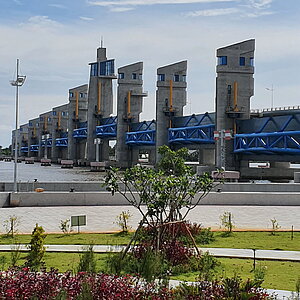Enhancing Climate Services for Infrastructure Investments (CSI)
To supply their growing populations with energy and water, and to design sustainable transport systems, developing and emerging countries now have an increasing need for extensive physical infrastructure. All too often, however, climate risks and their associated costs fail to be addressed at the planning stage of such infrastructure projects. The CSI project is therefore advising government agencies and decision-makers in partner countries on the integration of climate services (targeted climate information and risk assessments) into investment planning. This aims to identify climate risks and create a set of sustainable adaptation options with viable funding strategies. The project is working to improve climate data and the evaluation of digital applications to create a market for climate services, while assessing climate risks (for bridges, barrages, power grids, and others) and preparing guidelines that aim to integrate climate risk assessments into investment planning at national level.
- Countries
- Brazil, Costa Rica, Viet Nam
- IKI funding
- 8,510,000.00 €
- Duration
- 03/2017 till 03/2024
- Status
- completed
- Implementing organisation
- Deutsche Gesellschaft für Internationale Zusammenarbeit (GIZ) GmbH
- Political Partner
-
- Ministry of Environment - Brazil
- Ministry of Environment and Energy (MINAE) - Costa Rica
- Ministry of Planning and Investment - Viet Nam
- Ministry of Transport - Brazil
- Nile Basin Initiative (NBI)
- World Meteorological Organisation
- Implementing Partner
-
- Climate Risk Institute (CRI) - Canada
- Deutscher Wetterdienst (DWD)
- Institute for Catastrophic Loss Reduction (ICLR) - Canada
- Ministry of Environment - Brazil
- National Institute for Space Research (INPE) - Brazil
- Nile Basin Initiative (NBI)
- World Federation of Engineering Organisations (WFEO)
State of implementation/results
- The partner countries of the CSI project are faced with the challenge of drafting political and legal framework conditions for climate change adaptation and of implementing suitable measures. The CSI project therefore advised both, political decision-makers and those responsible for implementation.
- On the basis of specifically created climate information, several climate risk assessments were carried out in the partner countries (as of 2021). This included, among others, an existing bridge in Costa Rica and a planned flood barrier in the Mekong Delta in Viet Nam whilst in the region of the Nile Basin Initiative (NBI), a planned irrigation and hydropower project served as a case giver for the creation of a “Climate Proofing” guideline. In Brazil, the climate risk assessments of two power supply networks and three harbours were also completed; this was followed by country wide analyses in the transport sector.
- The partners were given further advice on how to use these methodological approaches for public and private infrastructure projects at a wider scale. They were also supported in identifying global solutions and in jointly exchanging experiences on implementation aspects.
- The legal basis was created in Costa Rica by a decree of the state president and in Vietnam by the adapted environmental legislation. In Costa Rica, the climate risk protocol MERCI-CR was officially adopted.
- In addition, the project advised on the use of digitization potential to improve climate services.
- In 2022, the international PIEVC Practitioner’s Network for climate risk analyses was founded; in April, 2023, the first PIEVC International Practicioner’s Forum took place in Vancouver.
- The e-learning course “Climate Proofing of Infrastructure Investments” is available for use on the ATINGI learning platform: online.atingi.org/…
Latest Update:
04/2025
Further links
- PIEVC High Level Screening Guide
- Publication: PIEVC Green (incl. EbA)
- MERCI Protocol Costa Rica (ES)
- Log-in page for Practitioners Network PIEVC
- Manual: IEVC Large Portfolio Assessment Manual
- Climate Proofing Hub for Climate Resilient Water Infrastructure Investments (Nile Basin Initiative)
- Portfolio Screening: Impacts and Risks of Climate Change to Brazilian Coastal Public Ports
- Publication: Interactive CSI Product Landscape with Current Project Results
- Website: Adaptation Community Website with reports and further project outputs
Project relations
Legend:
The link has been copied to the clipboard




















